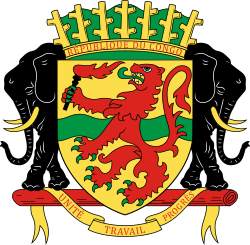This article relies largely or entirely on a single source .(January 2024) |
 |
|---|
The Constitution of the Republic of the Congo is the basic law governing the Republic of the Congo. [1] In it, it is stated that the Republic of the Congo is a pluralistic, multi-party democracy. A presidential system since 2009, the president's term was originally 7 years, which has now been reduced to five after a 2015 constitutional referendum that instituted a new Constitution, which also reinstated the position of Prime Minister and moved the country to a semi-presidential system. The Council of Ministers – the government – is appointed by the President.
Contents
The country's parliament is bicameral, made up of a National Assembly and a Senate.
The chief court is the Supreme Court. In addition, Congo has a Constitutional Court which rules on constitutional matters.
Congo is divided into 12 départements (counties or regions), each of which has its own local council.
The old and new constitutions both reference several important texts with reference to basic human rights:
- The UN Charter
- The Universal Declaration of Human Rights
- The African Charter on Human and People's Rights
- The 1991 Congolese Charter of National Unity and the Charter of Rights and Freedoms
Congo is a decentralised, secular and democratic republic.